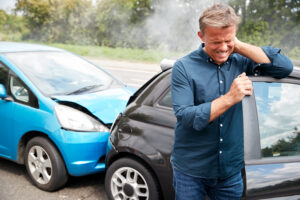
Headache After a Car Accident: Why It Happens and What To Do
Car accidents, even seemingly minor ones, can leave a lasting impact on our bodies and minds. Headaches after a car accident are common occurrences that many accident victims suffer. If you’ve recently been in a car accident and find yourself grappling with persistent headaches, you’re not alone. Understanding the reasons behind post-accident headaches and knowing how to deal with them is crucial for your overall well-being, and for the medical and legal aspects of your situation.
In this guide, we’ll shed light on the intricate relationship between car accidents and headaches, providing insights into why they occur, the potential legal implications, and steps you can take to address both your health and your rights. As a law firm focused on representing clients after car accidents, we recognize the multifaceted challenges you may be facing. Our goal is to equip you with the knowledge needed to make informed decisions about your well-being and potential legal recourse.
What Causes a Headache After a Car Accident?
In this section, we will explore the key factors contributing to headaches after a car accident and their significance in the aftermath of a collision.
A. Impact on the Head and Neck
The immediate impact of a car accident, especially collisions that involve sudden deceleration or changes in speed, can result in forceful movements of the head and neck. This abrupt motion can strain muscles, ligaments, and other structures, leading to headaches. Impact-related headaches can be symptoms of a traumatic brain injury, like a concussion. Listed below are other symptoms associated with a concussion.
Confusion: Feeling disoriented, confused, or having difficulty concentrating.
Memory problems: Forgetfulness or difficulty recalling events before or after the accident.
Nausea and vomiting: Feeling nauseous or actually vomiting.
Dizziness or balance problems: Feeling unsteady, lightheaded, or having difficulty maintaining balance.
Sensitivity to light or noise: Increased sensitivity to light (photophobia) or noise (phonophobia).
Visual disturbances: Blurred vision, double vision, or other visual problems.
Fatigue: Persistent tiredness or a feeling of being easily exhausted.
Sleep disturbances: Changes in sleep patterns, such as difficulty falling asleep or excessive sleepiness.
Mood changes: Irritability, mood swings, anxiety, or feelings of sadness.
Slurred speech: Difficulty articulating words or speaking clearly.
From a medical standpoint, understanding the biomechanics of these impacts is crucial in assessing the extent of injuries. Legally, it forms a substantial basis for demonstrating the connection between the accident and subsequent health issues.
It’s also important to note that symptoms may not always manifest immediately after a car accident and can develop over time. If you suspect a concussion or experience any of these symptoms following a car accident, it is essential to seek medical attention immediately. Concussions require proper evaluation and management to ensure a safe and healthy recovery. Ignoring or neglecting a concussion can lead to complications and prolonged symptoms.
B. Whiplash Injuries
Whiplash, a common injury in car accidents, occurs when the head is suddenly jerked backward and then forward, straining the neck’s soft tissues. Beyond the immediate pain and discomfort, whiplash can be a contributing factor to persistent headaches. In addition to headaches after a car accident, you may experience other common whiplash symptoms that include:
Neck pain and stiffness: This is the most common symptom. Pain and stiffness may develop gradually or be immediate.
Fatigue: Feeling tired or fatigued is a common complaint after a whiplash injury.
Dizziness: Some people may experience dizziness or a feeling of lightheadedness.
Shoulder pain: Pain and discomfort may extend from the neck to the shoulders.
Back pain: Pain may be felt in the upper or lower back.
Arm pain or numbness: Some individuals may experience pain, tingling, or numbness in the arms.
Jaw pain: Whiplash can cause temporomandibular joint (TMJ) dysfunction, leading to jaw pain.
Difficulty concentrating: Some people may have difficulty concentrating or remembering things.
Sleep disturbances: Sleeping difficulties, such as insomnia or restless sleep, may occur.
If you suspect you have whiplash or experience persistent symptoms like headaches after your car accident, seek medical attention immediately for a proper diagnosis and appropriate treatment.
C. Stress and Anxiety Factors
The aftermath of a car accident is often accompanied by heightened stress and anxiety levels. The emotional trauma stemming from the incident can exacerbate headaches or contribute to their onset. one common aftermath is the development of Post-Traumatic Stress Disorder (PTSD). Individuals who have been involved in a car accident may find themselves grappling with persistent emotional distress and anxiety. PTSD can manifest in various ways, including intrusive memories, flashbacks, nightmares, and heightened emotional reactivity. The sound of a car crash, the sight of the accident scene, or even the act of driving can trigger intense fear and panic in those with PTSD. The emotional aftermath of a car accident can interfere with daily life, affecting relationships, work, and overall well-being.
Seeking professional help, such as therapy or counseling, is crucial for those grappling with post-traumatic stress after a car accident, as it can provide coping strategies and support to navigate the emotional challenges associated with this condition.
What Should You Do if You Have a Headache After a Car Wreck?
The aftermath of a car accident is a challenging time.This section emphasizes the crucial steps to take immediately following a car accident to address post-collision headaches.
Seek Medical Attention Immediately
The first and foremost action to prioritize is seeking immediate medical attention. Even if your injuries seem minor initially, headaches can be indicative of underlying issues that may escalate without proper assessment.
Follow Your Medical Provider’s Recommendations
Once under medical care, adhere diligently to the treatment guidelines prescribed by your doctor. Whether it involves medication, physical therapy, or other interventions, following the recommended protocol is crucial for your recovery.
Consult a Car Accident Lawyer
In addition to seeking medical care, it’s essential to consult with a car accident attorney promptly. Discover how legal representation can help you recover compensation for your damages, encompassing medical expenses, lost wages, pain and suffering, and more. Waiting can jeopardize the timeline for building a robust case. The sooner you connect with an attorney, the quicker the process can begin.
After an accident, immediate emergency care can identify existing head injuries through thorough examinations, blood tests, and brain function tests. This comprehensive medical assessment not only addresses your immediate health concerns but also establishes a solid foundation for any potential legal actions.
Don’t Dismiss a Headache After a Car Accident
While headaches are common and can result from various factors, they can also be indicative of more severe underlying issues, especially after a traumatic event like a car crash. One of the primary concerns is the possibility of a concussion, which occurs when the brain sustains a sudden jolt or blow. Concussions may not always manifest immediate symptoms, and headaches can be a delayed reaction, signaling neurological trauma. Ignoring these headaches could lead to undetected and untreated brain injuries, posing long-term risks to cognitive function and overall well-being.
Furthermore, headaches following a car accident may be linked to other injuries such as whiplash, cervical strain, or even more severe conditions like intracranial bleeding. The delayed onset of symptoms doesn’t diminish their significance; rather, it emphasizes the importance of seeking prompt medical attention.
Ignoring a headache may not only hinder the recovery process but also jeopardize the accident victim’s health by allowing potentially serious conditions to worsen over time. In the aftermath of a car accident, prioritizing one’s health and promptly addressing any signs of discomfort, especially headaches, is crucial to ensuring a comprehensive and timely recovery.

Attorney Jay Pickering brings over 27 years of unwavering dedication to personal injury law, with a sharp focus on representing those injured in car, truck, and motorcycle accidents across Alabama. A proud alum of the University of Alabama School of Law, Jay is a member of the Alabama State Bar and the American Bar Association.

